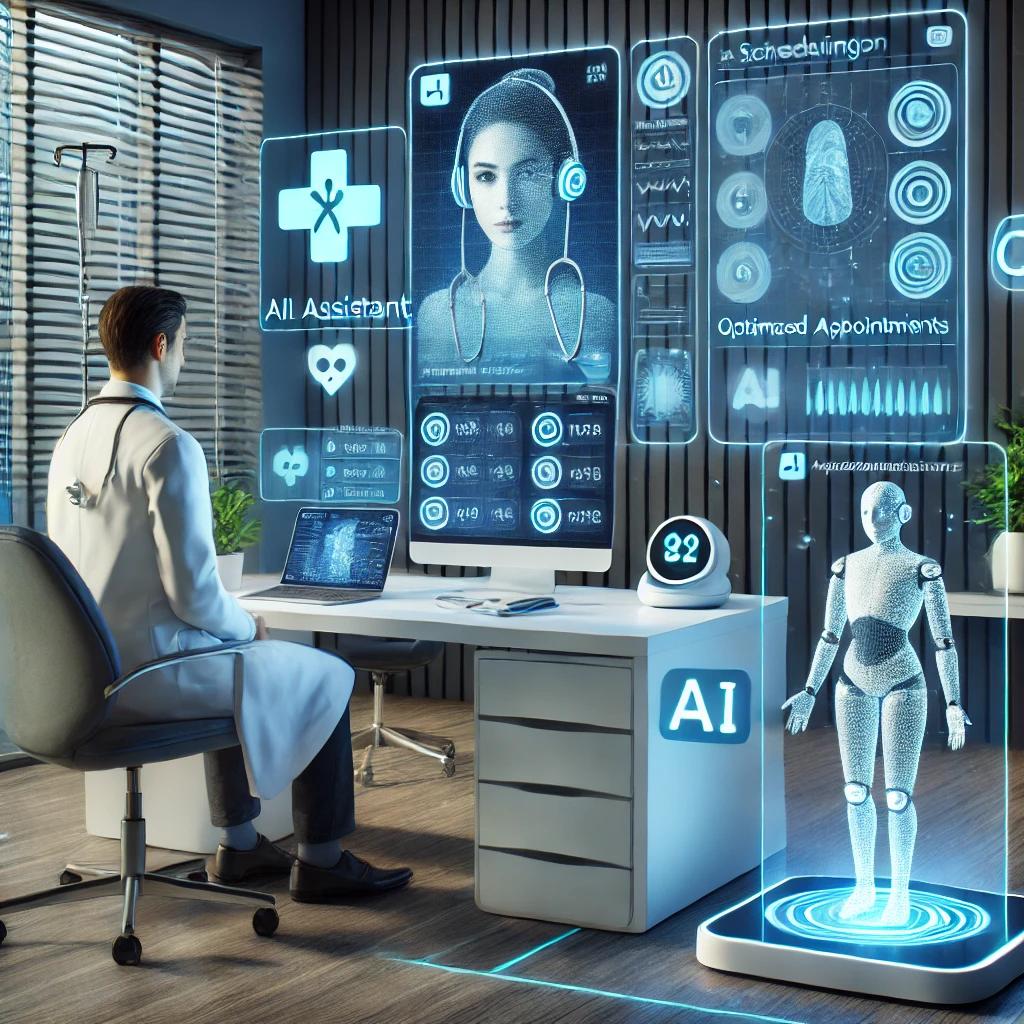
AI is revolutionizing healthcare by enhancing diagnostics, improving efficiency, and personalizing patient care. AI-powered systems assist doctors in scheduling, data analysis, and patient monitoring, ensuring optimized workflows and improved treatment outcomes.
AI in the Doctor's Office: A Guide to Smart
Healthcare
Chapter 1: Introduction to AI in Healthcare
1.1 What is AI
in Healthcare?
Artificial Intelligence (AI) is transforming the
healthcare industry by enhancing diagnostics, improving efficiency, and
personalizing patient care. AI refers to computer systems that mimic human
intelligence through machine learning, natural language processing (NLP),
and predictive analytics. These technologies allow AI to process vast
amounts of medical data, recognize patterns, and assist healthcare
professionals in making informed decisions.
In a doctor's office, AI
applications range from automated scheduling and AI-assisted diagnostics to
virtual health assistants that guide patients through their medical
journeys.
Real-World Example: AI in Medical Imaging
One of the
most impactful AI applications in healthcare is radiology. AI-driven systems
like IBM Watson Health and Google's DeepMind analyze X-rays, MRIs, and CT
scans with higher accuracy than human radiologists in some cases.
Case Study: In a Stanford University study, an AI model identified pneumonia
in chest X-rays better than human radiologists, detecting abnormalities
faster and reducing diagnostic errors.
Impact on Doctor's Offices:
Primary care providers using AI-assisted imaging tools can get faster, more
accurate results, allowing for quicker patient referrals and treatment
initiation.
Quote on AI in Healthcare
"AI won't replace doctors, but
doctors using AI will replace those who don't." : Dr. Eric Topol, AI and
Medicine Researcher
1.2 Why AI for Doctor's Offices?
AI is no
longer limited to large hospitals and research institutions. Primary care
clinics, dental offices, chiropractors, and private practices can leverage
AI to improve efficiency and patient care.
Key Benefits of AI for
Medical Offices
✅ Efficiency & Time-Saving: AI automates administrative
tasks, allowing doctors to spend more time with patients.
✅ Improved
Accuracy: AI reduces diagnostic and billing errors.
✅ Enhanced Patient
Experience: AI chatbots handle patient inquiries 24/7.
✅ Cost Reduction:
Automated processes reduce operational costs.
✅ Predictive Analytics: AI
helps detect diseases early by analyzing patient history.
Real-World
Example: AI Scheduling and Workflow Optimization
Zocdoc, an AI-powered
patient scheduling platform, reduces no-shows by sending automated reminders
and offering real-time rescheduling.
Impact on Doctor's Offices:
AI-driven scheduling software like Nabla and HealthTap ensures better
patient flow, fewer missed appointments, and reduced administrative
workload.
Case Study: AI in Dermatology
AI has also been
revolutionizing dermatology by analyzing skin conditions.
Google's
AI-based dermatology assistant helps general practitioners detect skin
cancers and rashes with dermatologist-level accuracy.
Impact: Patients
get quicker referrals, and doctors avoid unnecessary tests.
1.3
Challenges and Ethical Considerations
Despite its potential, AI in
healthcare raises ethical and practical challenges.
1.3.1 Data
Privacy and Security
AI systems rely on vast amounts of patient data,
which must be protected under laws like HIPAA (U.S.) and GDPR (Europe).
Risk: AI tools collect sensitive health data, making them potential
targets for cyberattacks.
Solution: Medical offices must use AI tools
with strong encryption and strict access controls.
1.3.2 Bias and
Fairness in AI Models
AI models may inherit biases from the data they are
trained on.
Example: AI systems trained on historically biased
medical data might misdiagnose certain conditions in underrepresented
populations.
Solution: Developers must ensure AI models are trained on
diverse datasets.
1.3.3 AI's Role vs. Human Judgment
AI is an
assistant, not a replacement for doctors.
Example: AI tools can
suggest diagnoses, but only doctors can confirm and contextualize them.
Quote on AI Ethics in Medicine
"The challenge is not AI taking over but
ensuring AI serves as a tool for better patient outcomes." : Dr. Fei-Fei Li,
AI Ethics Expert
1.4 The Role of AI in Small and Medium-Sized
Practices
Many small clinics assume AI is only for hospitals, but even
solo practitioners can benefit.
How Small Practices Use AI Today:
✅ AI-Powered EHR (Electronic Health Records) � AI summarizes patient
histories and suggests relevant information.
✅ AI Chatbots � Handle
patient inquiries, freeing up office staff.
✅ Automated Medical Billing �
Reduces errors and increases efficiency.
Real-World Example: AI in
Chiropractic Clinics
Chiropractic offices use AI-powered posture analysis
tools like PhysiMax to analyze spinal alignment and suggest personalized
treatment plans.
Review Questions
1. What are the primary benefits
of AI in a doctor's office?
A. Faster diagnostics
B. Improved
efficiency
C. Cost savings
D. All of the above
2. How can AI
help in diagnostics?
A. Replacing doctors completely
B. Assisting in
interpreting medical images and lab results
C. Making medical decisions
without human input
D. Ignoring patient history
3. What is one
ethical challenge of AI in healthcare?
A. AI is always correct
B. AI
may have biases based on training data
C. AI replaces doctors completely
D. AI does not affect healthcare at all
4. How does AI improve
scheduling in medical offices?
A. By calling each patient manually
B.
By automating reminders and optimizing patient flow
C. By replacing
receptionists
D. By guessing patient needs
Answer Key:
D (AI
improves efficiency, speed, and cost-effectiveness)
B (AI assists in
analyzing medical images and lab results)
B (AI models can inherit biases
from their training data)
B (AI automates appointment reminders and
optimizes scheduling)
References & Further Reading
Topol, Eric. Deep
Medicine: How Artificial Intelligence Can Make Healthcare Human Again. Basic
Books, 2019.
Fei-Fei Li, John Etchemendy. AI and Healthcare: The Ethical
Challenges and Future Trends. Stanford University AI Research Lab, 2021.
Stanford University Study on AI in Radiology. Published in Nature Medicine,
2020.
Final Thoughts on Chapter 1
AI is revolutionizing healthcare,
even in small doctor's offices. From faster scheduling to AI-powered
diagnostics, it helps improve patient care, efficiency, and accuracy.
However, AI must be ethically integrated with human oversight.